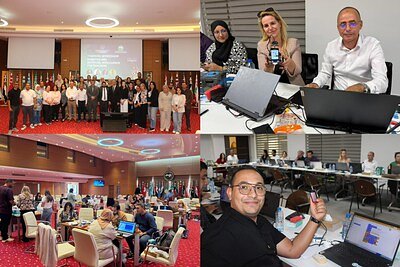
Tunisia's AI Push: DFRobot Partnership Plants Seeds for Future-Ready Education
A new partnership between DFRobot and ALECSO is bringing hands-on AI and robotics training to Tunisian educators, aiming to bridge the skills gap and prepare students for a tech-driven future. Is this a model for the region?
Tunisia's AI Push: DFRobot Partnership Plants Seeds for Future-Ready Education
Shanghai & Tunis, November 15, 2025 – As nations globally race to prepare their workforces for an increasingly automated future, Tunisia is taking a proactive step with a new initiative focused on equipping its educators with the skills to teach Artificial Intelligence and robotics. Last month, global STEAM education innovator DFRobot, in collaboration with the Arab League Educational, Cultural and Scientific Organization (ALECSO), concluded a three-day intensive training workshop for Tunisian teachers, marking a significant investment in future-ready education.
The workshop, held from October 28-30, wasn’t simply about introducing new technology; it was a carefully designed learning journey. Participants moved from mastering basic robot control with the micro:Maqueen Plus and AI vision applications using the HuskyLens, to advanced AI development with the UNIHIKER K10 kit – learning to invoke AI modules for facial recognition and even training their own recognition models. The culmination was an “AI Maker Hackathon” where teachers collaboratively designed and presented complete AI projects, reinforcing principles of project-based learning and design thinking.
Beyond the Tools: A Strategic Investment
While the hands-on training with tools like the UNIHIKER K10 is crucial, industry analysts say the program represents a deeper strategic investment. “Many initiatives focus solely on what technology to use,” explains a technology consultant familiar with the region’s educational landscape. “This program appears to be focusing on how to integrate AI and robotics into the curriculum effectively, and empowering teachers to become champions of this change.”
DFRobot’s commitment extends beyond a single workshop. Sandy Zhang, CMO of DFRobot, emphasizes a long-term vision. “We see this as more than just a training session. It’s about building a sustainable ecosystem through localizing curricula, providing continuous teacher development, and establishing demonstration hubs.” This commitment to building local capacity is seen as a key differentiator, addressing concerns that many technology initiatives in the region lack staying power.
Bridging the Skills Gap in the Arab World
The initiative arrives at a critical time. The Arab world, like many regions, faces a growing skills gap in STEM fields, particularly in AI and data science. A recent World Economic Forum report highlighted the urgency of reskilling and upskilling the workforce to meet the demands of the Fourth Industrial Revolution. “The challenge isn’t just about having enough STEM graduates,” explains an education policy expert working with ALECSO. “It’s about ensuring that education is relevant, engaging, and prepares students for the jobs of the future.”
ALECSO’s involvement underscores the regional importance of this initiative. The organization has been actively promoting STEM education across its member states, with a particular focus on integrating technology into the curriculum. “We believe that AI and robotics have the potential to transform education and create new opportunities for our students,” says an ALECSO representative. “This partnership with DFRobot is a significant step towards realizing that potential.”
Tunisia: A Regional Leader in Educational Innovation?
Tunisia has emerged as a potential leader in educational innovation in the region, driven by a national strategy that prioritizes digital literacy and STEM education. The country’s “National Education Strategy 2016-2030” explicitly calls for integrating technology into the classroom and preparing students for the digital economy. “Tunisia has a relatively strong educational infrastructure and a commitment to reform,” says a regional analyst. “This creates a favorable environment for initiatives like this to succeed.”
However, challenges remain. Access to technology and internet connectivity is unevenly distributed, particularly in rural areas. Teacher training needs to be ongoing and sustained, and curriculum reforms must be aligned with the needs of the labor market. A local educator participating in the DFRobot workshop shared, “The training was fantastic, but we need more resources and support to continue developing our skills and implementing these new technologies in our classrooms.”
A Model for the Region?
The DFRobot-ALECSO partnership is drawing attention from other Arab nations seeking to enhance their STEM education programs. Several countries are reportedly exploring similar initiatives, focusing on teacher training, curriculum development, and the integration of AI and robotics into the classroom. “What’s particularly interesting about this model is the emphasis on sustainability,” says a technology consultant. “It’s not just about delivering a workshop and walking away. It’s about building local capacity and creating a long-term ecosystem for innovation.”
The success of this initiative will depend on several factors, including sustained investment in teacher training, equitable access to technology, and a commitment to curriculum reform. However, the early signs are promising, suggesting that this partnership could serve as a valuable model for other nations seeking to prepare their students for the challenges and opportunities of the 21st century. The investment in educators, combined with a focus on sustainable implementation, sets this program apart and signals a proactive approach to bridging the skills gap and fostering innovation in the Arab world.
While challenges remain in scaling such initiatives across diverse educational systems, the commitment to building local capacity and fostering a long-term ecosystem for innovation could prove to be a crucial factor in the success of this program, and potentially, a template for future educational advancements across the region.
